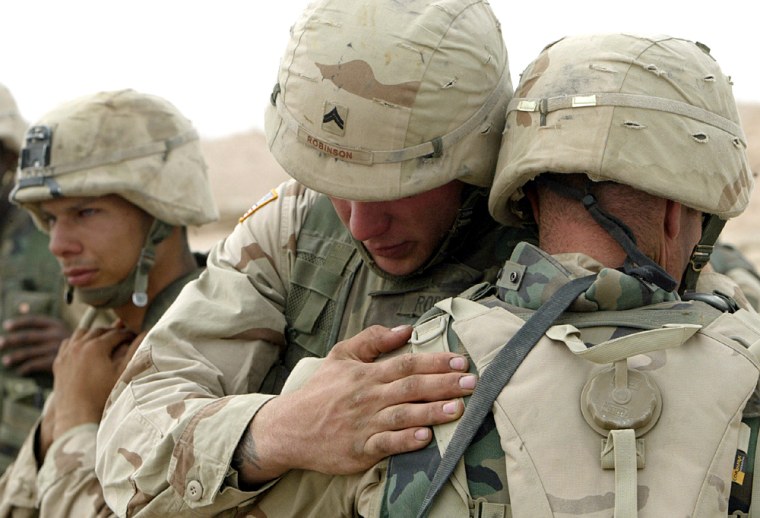The Pentagon formally announced Thursday that it had stopped the planned return from Iraq of some 20,000 American troops, giving commanders the extra firepower they believe necessary to confront an insurgency that is taking a mounting toll on the U.S.-led coalition.
The decision, announced by Defense Secretary Donald Rumsfeld after first being reported Wednesday, breaks a promise to soldiers who were assured when they arrived in Iraq that they would stay no more than one year. By extending their tours of duty by three months, the Pentagon is acknowledging that the insurgency has ruined its plans to reduce the size of the U.S. military presence this spring.
The troops had expected to return home this month after completing 12 months in Iraq.
“We regret having to extend those individuals,” Rumsfeld said, adding that the American public is grateful for their sacrifices. “What they’re doing is important. It’s noble work, and in the end it will be successful,” he said.
Earlier Thursday, Gen. Richard Myers, chairman of the Joint Chiefs of Staff, told reporters in Baghdad, where he was visiting top generals, that U.S. authorities had been facing "significant security challenges" over the last two weeks — a reference to the battle for the Sunni stronghold Fallujah, the clashes with supporters of a radical Shiite cleric in southern Iraq and a wave of kidnappings of foreign civilians.
Some troops likely from Germany
Gen. Peter Pace, vice chairman of the Joint Chiefs, said the 20,000 soldiers are mainly from the 1st Armored Division and the 2nd Armored Cavalry Regiment. A more detailed breakdown was not immediately announced.
Other officials said that approximately 14,500 soldiers of the 1st Armored, which is based in Germany, plus about 3,200 support troops and about 2,800 soldiers of the 2nd Armored Cavalry, based at Fort Polk, La., have been told that they will remain in Iraq for another three months instead of coming home this month.
Rumsfeld said that about one-quarter of the 20,000 troops being extended are members of the National Guard or Reserve. He did not mention an exact number or identify the Guard or Reserve units.
The United States has a total of about 137,000 troops in Iraq now, Rumsfeld said. That number was supposed to have dipped to 115,000 by May, but Rumsfeld said Gen. John Abizaid, the overall commander of the Iraq war, decided he needs to keep the force level at about 135,000 troops.
Some critics have asserted throughout the U.S. occupation of Iraq that the military had too few troops on the ground to stabilize the country and assure its economic and political rebuilding.
Fresh troops possible later
Rumsfeld said that if Abizaid decides he needs to maintain the same troop strength in Iraq after the 90-day extension runs out, the Pentagon will send fresh forces from the United States or elsewhere.
The troop extensions come at a particularly delicate moment. April has become the deadliest month for U.S. forces in Iraq since they set foot in the country in March 2003. The number of wounded also has skyrocketed.
At the Baghdad news conference Thursday, Myers was asked whether the troop extensions indicate plans for large-scale offensive operations. He did not answer directly, saying the move was deemed necessary given “extremist and terrorist acts that must be dealt with.”
Myers said it has yet to be determined how long the added combat power will be kept in Iraq.
A resolve to stay put
“It will depend on events here on the ground,” he said. “But I think what it shows is our resolve to see this situation through.” Myers was in Baghdad for talks with U.S. and coalition commanders and to meet with L. Paul Bremer, Iraq’s U.S. administrator.
The advantage of keeping soldiers of the 1st Armored and the 2nd Armored Cavalry in Iraq for an extra three months — rather than bringing in an equivalent number from elsewhere — is that these soldiers have unmatched combat experience in Iraq and familiarity with insurgents’ tactics.
The Army is so stretched by its commitments in Iraq, Afghanistan, the Balkans and elsewhere that it has few, if any, forces immediately available to substitute in Iraq for the 1st Armored or 2nd Armored Cavalry.
Also, these units have been heavily involved in one of the most important U.S. military missions there: training thousands of Iraqi security forces central to the Pentagon’s plan for eventually turning over military control to the Iraqis and pulling out U.S. troops.
Rumsfeld ‘fungible’ comment draws Kerry ire
In his news conference Thursday, Rumsfeld, responding to a reporter's question about why more troops were needed when the situation in the south of Iraq had largely stabilized, said “the reason it is contained is because we have the extra troops there. That is self-evident. Come on, people are fungible. You can have them here or there.”
Rumsfeld's comment drew immediate fire from Democratic presidential hopeful Sen. John Kerry, in a statement released hours later.
“Secretary Rumsfeld's comment that 'people are fungible' is further indication of this Administration's continuing disregard for the men and women who put their lives on the line every day in Iraq,” Kerry's statement read.
“Secretary Rumsfeld has it wrong,” the statement read. “Troops are not chess pieces to be moved on a board, they are real people with families and loved ones who depend on them. From failing to provide our troops with adequate body and vehicle armor to breaking their commitment not to extend assignments beyond one year, this Administration has continually let them down.”
The statement continues: “They deserve more than cold impersonal calculations when their tours are extended, they deserve compassion and understanding of the sacrifice they and their families are making for their country.”
